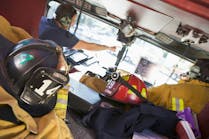Legal Lesson Learned: I had the honor of working my last shift (a busy shift - 19 runs) with a firefighter/paramedic who has been sober for over 10 years. I am inspired by his courage to share his personal story with me and other firefighters - "One To One." I serve on the Southwest Ohio CISM Team, and we are starting a "One To One Program" where emergency responders who have been in recovery for at least five years can join our team and confidentially assist other emergency responders.
Negative Press Reports
Unfortunately, the press is full of negative stories about firefighters and alcohol. For example, on August 13, 2007, an Ohio firefighter, convicted of his fourth off-duty drunk-driving offense was sentenced to three days in jail and three-days in a lockdown substance abuse program, with his driver's license suspended for three years.
On August 7, 2007, an assistant chief from Kentucky was fired - he reportedly was drinking beer on fire department property with a friend, and invited the civilian to climb up on the platform of their new $700,000, 110-foot aerial. The assistant chief extended the new aerial over the fire station, and in the process the civilian was seriously injured and required surgery.
Court Cases
On August 2, 2007, the U.S. Court of Appeals for the 5th Circuit held in David Phillips v. City of Victoria, Texas, 2007 U.S. App. LEXIS 18427 (unpublished opinion), that suspension of a firefighter's emergency driving privileges is an "adverse employment decision." The court held that David Phillips, then President of the Victoria Fire Fighters Union ("VFFA"), can proceed with his First Amendment lawsuit against his fire chief and the city. The firefighter was driving his motorcycle off-duty, while intoxicated, and was involved in an accident. Phillips' lawsuit alleges (1) under the city's "Driving of Vehicles" policy his off-duty accident was not a basis to suspend his emergency driving privileges, and (2) the fire chief's suspension of emergency driving privileges was in retaliation for the grievance Phillips filed on behalf of the VFFA against the fire chief.
Substance Abuse Polices
Many fire departments have substance abuse policies and provisions in their collective bargaining agreements that require firefighters who test positive in a drug test to obtain substance abuse counseling through an employee assistance program (EAP).
For example, the Columbus, OH Fire Department policy provides:
"The City of Columbus will not discharge a member who tests positive a first time (whether reasonable suspicion, random, refusal to test), but may suspend such member. The length of that suspension shall be determined on a case-by-case basis, but shall not ordinarily exceed ten (10) calendar days unless, as set forth in Section 32.8 of the Collective Bargaining Agreement, the employee has failed before the end of that 10-day period to provide the City with results of an evaluation."
Voluntary assistance is encouraged:
"Members who voluntarily request assistance shall not be disciplined if said member complies with all the terms and conditions of Section 32.10 of the Collective Bargaining Agreement."
"One To One" Program - Ohio Confidentiality Statute
The Southwest Ohio CISM Team is launching the "One To One" Program so firefighters, EMS, police and dispatchers in our 13 area counties can seek confidential assistance from "recovering" emergency responders who have joined our team.
On January 27, 2006, a new Ohio confidentiality law became effective (Senate Bill 19, 126th General Assembly). It provides a testimonial privilege to "critical incident stress management team members," under which such members cannot testify concerning a communication received from an individual who receives crisis response services from the team member, or the team member's advice to the individual during a debriefing session.
CISM Speaker's Bureau
My firefighter/paramedic partner, in recovery for over 10 years, is not only saving civilian lives while on duty, he is saving the careers of fellow emergency responders. He is helping our CISM team form a speaker's bureau where other "recovering" emergency responders can share their stories with fire & EMS departments throughout our 13-county region.
If the new program is successful, we plan to share it with the 33 other CISM teams in Ohio, and with teams throughout USA.
Larry Bennett is an attorney, adjunct professor at University of Cincinnati's Fire Science Department, a volunteer firefighter/EMT for the past 27 years, and is author of a new textbook that has recently been selected for use by the National Fire Academy, Fire Service Law, by Prentice Hall/Brady. Larry writes a free, monthly Fire & EMS and safety newsletter which you can sign up for at www.katzmanlaw.com. You can contact Larry by e-mail at: [email protected].





